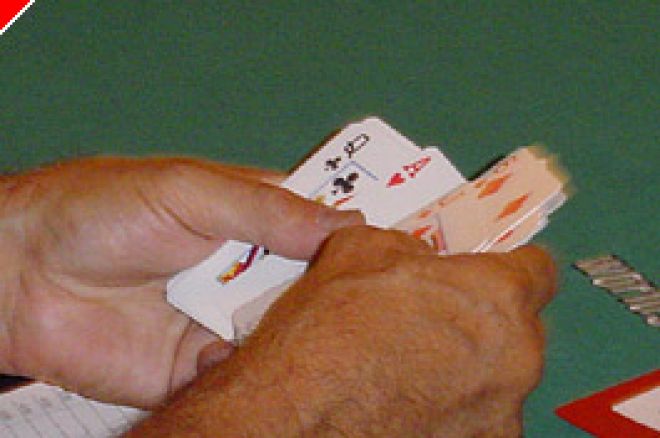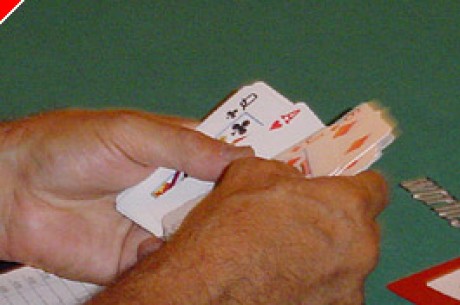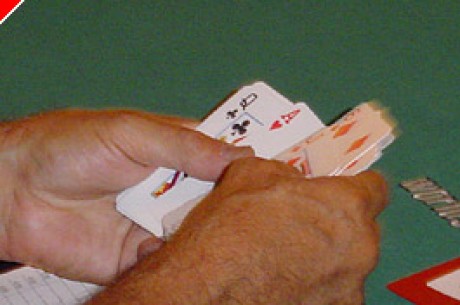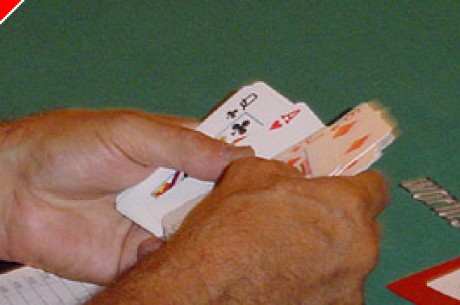Stud Poker Strategy - WSOP Lessons, Part One

I'm a grinder �� if I'm an anything. I play medium and small stakes stud and hold 'em and grind out a profit. I have a day job as a union negotiator and play poker more as a hobby than for a living. Still it's a profitable hobby. I can make a decent hourly rate �� about $35/hour playing $20/40 stud and maybe $12-25/hour at $1/2 and $2/5 no limit hold 'em (though the huge variance in no limit makes it hard to pin down an hourly number). I win more than my share of small tourneys �� both on line and in casinos. If I were a baseball player you'd put me up there in the high minors �� good glove and good enough to hit well against minor league pitching but not ready for 'The Show'.
So what was I doing at the World Series of Poker? What was I doing competing with the very best in the world? There in lies a tale worth telling �� over a few columns.
First of all, my analogy not withstanding, poker is not baseball. Even in the biggest games there are many amateurs and otherwise bad players who can be exploited. Also, as a game that depends largely on luck, a three star player can beat a five star player in a tournament. It happens all the time. In fact, with all of the new players in the major tournaments these days, the best players win much less than half the time. It is the nature of our exploding poker universe to have amateurs entering and winning tournaments.
That could never happen in baseball, chess, darts, golf or any other games whose outcomes are determined virtually entirely by skill. But poker is different. We all have a chance to win any given tournament. That's the beauty of our game �� and what makes it so immensely popular.
So why was I at the World Series of Poker? At least part of it was because I wanted to win a bracelet. I entered the $1,000 buy-in two-day Stud high low split 8 or better tournament.
This was not the only reason I was there of course. As a member of the poker media, I also saw this as an excellent opportunity to hang out with my writing colleagues and friends. The World Series is the closest event to a poker convention that we have for the hobby. It's where everyone who is anyone in the poker world stops by, if only briefly, to renew acquaintances, check out the latest stuff, and engage in self-promotion.
But winning a bracelet was my chief goal.
Was it just a romantic pipe dream or a realistic goal? The more I think about the math of it the more I realize how distant were my chances �� even with the most inflated view of my talent. Let's look at it close up.
I'll start with the stud event I entered. This was a relatively small event for the WSOP �� with only about 750 entrants. If I figure myself to be three times as good as the average entrant then I am a 250:1 long shot. That's about the odds of winning eight coin flips in a row. Even finishing in the money is a long shot, a 25:1 long shot (since they pay about 10% of the field). That's a little better than picking the right number on a roulette wheel. Is it worth a $1,000 wager for that?
But that was just my lowly stud event. Let's look at the main event. Over 8,500 entrants. If you're three times better than the average player then you have a whopping 1666:1 shot of winning the event. You have a better chance of picking a number correctly in roulette twice in a row. And that's if you're three times better than average.
Actually, that doesn't quite do justice to the remoteness of your chances of winning. As much as the game is determined by luck, you have to figure that the best players will, in general, find their way to the final table. The worst players, it stands to reason, will be among the earliest players knocked out. By the time the field is winnowed down your fabled 3:1 advantage will surely be whittled down as well. How much better will you be against the final 20% of the players? Will you even be better than average against them?
OK. You get my point. No need for more doom and gloom. But leave it to say that though I had won a few weekly and daily tournaments in Las Vegas, California and Connecticut, I didn't rate my chances as very high for winning a WSOP event.
Still, there was an allure to the event �� a cache to it if you will that drew me in. I imagined what it would be like to have a gold bracelet �� not to mention the huge cash prize. For $1,000 I had a chance at poker immortality. That it was only a remote chance was not the point. And so I entered.
In my next column I'll let you know how I prepared.
Ed Note: Check out the Stud action at Noble Poker








